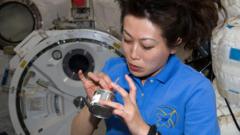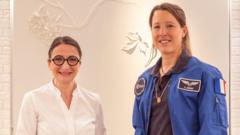A groundbreaking experiment led by the European Space Agency is testing the feasibility of growing lab-grown food in space. This innovative initiative seeks to reduce the exorbitant cost of feeding astronauts and lay the groundwork for sustainable food production in future interplanetary habitats.
Pioneering Food Production in Space: A Leap Towards Sustainable Astronaut Cuisine

Pioneering Food Production in Space: A Leap Towards Sustainable Astronaut Cuisine
European Space Agency's experiment aims to cultivate lab-grown food in low gravity, potentially revolutionizing nutrition for astronauts on long missions.
A transformative experiment launched today by the European Space Agency (ESA) may change how astronauts dine in space. The initiative is exploring the potential of cultivating lab-grown food—those created from individual cells—in low gravity and increased radiation environments, which is essential for future space missions. Currently, feeding an astronaut costs upwards of £20,000 per day, prompting a need for innovative solutions.
The ESA-funded research aims to establish a small pilot food production facility onboard the International Space Station (ISS) within two years. Dr. Aqeel Shamsul, CEO and founder of Bedford-based Frontier Space, emphasized the necessity of off-world manufacturing to support Nasa's ambition of making humans a multi-planetary species. He envisions factories operating in orbit, as well as on the Moon.
Dr. Shamsul explains that astronauts usually eat rehydrated meals, which lack variety and excitement. Lab-grown food could provide nutritious and appealing alternatives made from proteins, fats, and carbohydrates cultivated in a bioreactor. The project takes inspiration from successful earthbound lab-grown food ventures, such as chicken and soon, lab-grown steak, which is pending approval in multiple nations.
The ESA has launched a scaled-down version of the bioreactor into space as part of a mission carried by the SpaceX Falcon 9 rocket. This experiment will circle the Earth for three hours before splashing down off the coast of Portugal, where the data will be analyzed for developing a larger bioreactor for future missions.
Current challenges include the less-than-appetizing appearance of the lab-grown concoction, a task assigned to Imperial College's culinary education designer, Jakub Radzikowski. Although unable to utilize lab-grown ingredients yet, he is crafting versions of international dishes using natural ingredients. His recent creation, spicy dumplings, garnered approval from the UK's first astronaut, Helen Sharman, who noted the potential of lab-grown food to enhance astronauts' diets.
Sharman highlighted the considerable biochemical changes astronauts undergo during long missions, potentially benefiting from tailored lab-grown food, making it easier to maintain their health while addressing the monotony of space diets. As ESA's experiment unfolds, the hope lies in fostering sustainable, delicious cuisine for the astronauts of the future.
















